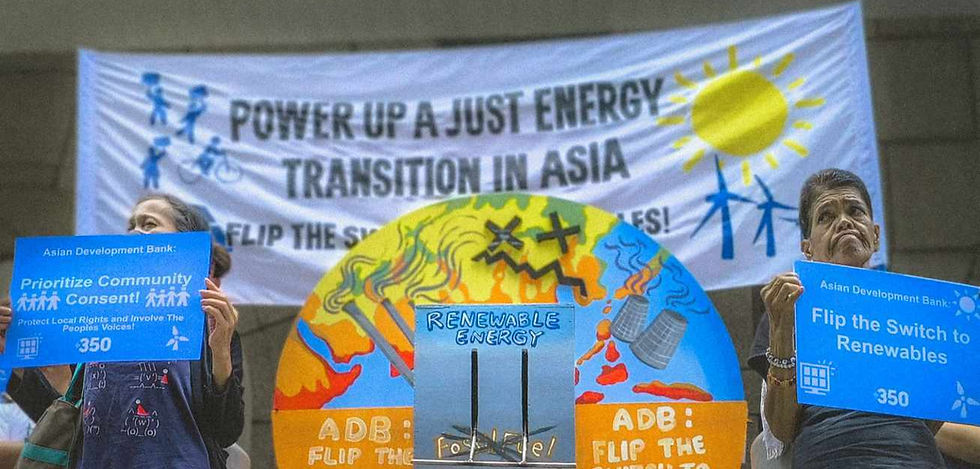
MANILA, June 6, 2024 -- A hundred activists gathered in front of the Asian Development Bank (ADB) headquarters here urging the bank to “flip the switch to renewables”, towards a fast and equitable clean energy transition that prioritizes people and the environment.
The creative action was staged by civil society groups and affected communities to challenge the ADB to not only fast-track the shift to renewable energy but also ensure transparent and equitable investments, prioritize community consultation, provide grants over loans in financing energy transition projects, and reject harmful energy solutions as the bank is holding its annual Asia Clean Energy Forum (ACEF) this week.
Activists from 350 Pilipinas, NGO Forum on ADB, GAIA Asia Pacific, Legal Rights and Natural Resources Center, and Freedom from Debt Coalition carried a globe effigy that showed dirty energy projects and climate impacts on one side and renewable energy and its benefits on the other. A switch in the middle made the globe spin, highlighting the role of ADB in the global switch to renewable energy.
The ACEF plays a crucial role towards transitioning from fossil fuels to renewables in the Asia-Pacific to combat climate change and ensure energy security. It convenes policymakers, industry leaders, and civil society to devise sustainable energy strategies and advocate for the shift to renewables.
However, affected communities and civil society groups have stressed that prioritizing corporate interests and technological fixes exacerbates environmental and social crises. Meanwhile, existing mechanisms promoted by the ADB at ACEF often fail to provide real energy solutions, including what many experts consider false solutions, such as carbon capture and storage, waste-to-energy, hydropower, and fossil fuel mixes.
“Real energy solutions must prioritize community needs, uphold environmental and human rights, and ensure a just transition from fossil fuels. The Asian Development Bank must uphold not only the Paris climate agreement but also the long-term development plans of ADB member countries.
Yet the current agenda of its Asia Clean Energy Forum falls short, which is why we call on the bank to reevaluate its strategies and commit to sustainable energy practices,” said the activists.
“As climate change impacts intensify, ADB and other global financial institutions must be held accountable for past and ongoing environmental and social harms. Forum network and allies demand a complete overhaul of key policy initiatives at ACEF 2024. With the upcoming ADB Mid Term Energy Policy Review, the NGO Forum on ADB and its allies call for an end to ADB's false solutions for a Just Transition and demand a full phase-out of fossil fuels, especially gas, and all forms of coal financing.”
Rayyan Hassan, Executive Director
NGO Forum on ADB
"As 2030 approaches, balancing equity, urgency, and ambition in energy transformation is crucial. We must exclude harmful energy solutions, prioritize equitable renewable energy investment, and ensure transparency, accountability, and community consultation. Climate action isn't just about hitting Paris Agreement targets—it's about transforming our development pathway to thrive amid climate change. This journey demands that climate and development progress be mutually reinforcing, with robust community ownership at its core."
Chuck Baclagon, Finance Campaigner
350.org Asia
"Addressing the climate crisis requires reimagining energy production and distribution to prioritize people and the environment. We need a rapid and fair shift to a clean energy economy that empowers communities and curbs profit-driven decisions that harm the planet. The Asian Development Bank's commitment to sustainable development and renewable energy is crucial for reshaping Asia and the Pacific's energy landscape and driving us towards a fossil-free future."
Fread De Mesa, Coordinator
350 Pilipinas
“We are urging ADB to stop supporting the institutionalization in regional and national climate policies and financing of the same dirty industries including waste-to-energy incineration which communities around the world have averted from entering and operating because of their environmental and social consequences. At the same light, we reject the use of new technologies such as carbon capture utilization storage and failed mechanisms such as carbon credits which merely delay and derail real climate action..We urge ADB to funnel much needed resources to proven and empowering community solutions to ensure that scarce resources work for people and the environment and not climate perpetrators”
Mayang Azurin, Deputy Director for Campaigns
GAIA Asia Pacific
“ADB must urgently strengthen its community consultation and consent mechanisms in regulating its growing clean energy transition portfolio. With an anticipated 500% increase in global renewable energy and energy transition mineral production by 2050, communities facing these projects bear immense risks of resource grabbing, displacement, and violence if no sufficient guardrails are implemented.
The right to free, prior, and informed consent (FPIC) of indigenous peoples must especially be guaranteed, as an estimated 42% of global spatial conflicts with indigenous territories involve renewable energy, and 60%of global mineral deposits are situated within indigenous territories.”
Leon Dulce, Campaigns Support and Linkages Coordinator
Legal Rights and Natural Resources Center (LRC)
"We from the Freedom from Debt Coalition (FDC) believe that it is completely unacceptable that the organizers of the ACEF 2024 led by the Asian Development Bank (ADB) continue to promote financing mechanisms that not only distract us from our goal of transitioning to full renewable energy, but also add to the country’s already mounting debt burden. Schemes like the Energy Transition Mechanism (ETM) can be used to leverage blended finance, including public funds, to allow coal investments to “re-purpose” operations, shifting from one fossil fuel to another. This will, in effect, delay, rather than accelerate the shift to RE systems and lead us away from the pathway to keeping global temperature changes within the goal of 1.5 C.”
Rovik Obanil
Secretary General
Freedom from Debt Coalition (FDC)

Kommentare